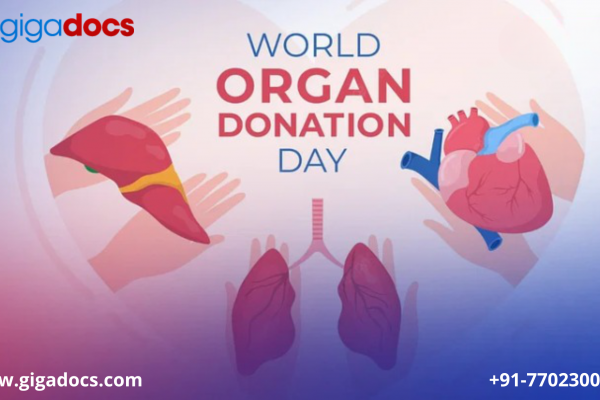The first question you’ll almost certainly be asked after announcing your pregnancy is, “When are you due?”
During your first prenatal visit, your health care provider will assist you with your EDD (expected delivery date), which is 40 weeks from the first day of your LMP (last menstrual period). It’s critical to remember that your due date is only an estimate. Do you know? Only a small percentage of women deliver on their due date? Most babies are born between 38 and 42 weeks after their mother’s LMP begins.
Gigadocs has bought you a guide to cover your journey as an expectant mother, the changes to your body, your eating habits, and the essential Dos and Don’ts on National Safe Motherhood Day. Let’s begin with the three trimesters of pregnancy:
Pregnancy Trimesters
Trimesters are the three stages of pregnancy:
Trimester one (week 1- end of week 12)
You may be required to make changes in your daily routine, like getting up earlier or eating smaller, more frequent meals. Though some women have a lot of discomforts, others have none at all. Symptoms, as described below, are common early pregnancy signs in many women:
- Extreme exhaustion
- Nausea, whether with or without vomiting (morning sickness)
- Cravings for certain foods or an aversion to them
- Mood Swings
- Constipation
- Frequent passing of urine
- Headache
- Heartburn
- Gaining or losing weight
Why is the First Trimester so Important?
If you’re pregnant for the first time, you’ve probably heard that the first three months are crucial for your baby. Yes, that is correct. Because 85 percent of miscarriages occur in the first trimester, pregnant women are advised to exercise extreme caution. The developmental stage lasts for three months. Your baby will experience the most rapid growth they have ever experienced during this time. Even though the baby is only the size of an apple by the end of the first trimester, it has all of the necessary genetics, nervous system, and major organs. It has limbs, a heartbeat, fingers, hair, and toes, among other things.
Dos during the First Trimester
- Consume nutritious, home-cooked meals rather than fast food, which may contain harmful colors and additives.
- Supplement with folic acid and vitamins.
- Many women throw up frequently, allowing them to eat whatever they want and in small portions rather than one large meal at a time.
- Maintain a well-balanced diet, and don’t worry about your calorie intake.
Do the following to rejuvenate and replenish your body:
- Sleep as much as you can rest your body.
- Don’t push yourself too hard.
- Before you begin exercising, make sure you have your doctor’s approval. If you are unable to exercise, slow walking is an excellent alternative.
Don’ts during the first trimester
During the first trimester, the fetus is vulnerable, and the risk of miscarriage is high. Because the fetus’ major organs are still developing at this stage, they are susceptible to damage from toxic chemicals, drugs, cigarette smoke, alcohol, and radiation.
- Do not smoke, chew tobacco, or drink alcoholic beverages.
- Avoid being in a polluted environment and passive smoking.
- Working with pesticides and fertilizers is not recommended.
- Only use natural and herbal cosmetics.
Second trimester (week 13 – end of week 26)
You may find that the second trimester is easier than the first. Your nausea (morning sickness) and fatigue may improve or disappear entirely. You will, however, notice more changes in your body. As your abdomen expands to accommodate the growing baby, that “baby bump” will appear. In the second trimester, you may notice the following changes in your body:
- Aches and pains in the back, abdomen, groin, or thigh
- Stretch marks on the abdomen, thighs, or buttocks.
- A skin line that runs from the belly button to the pubic hairline (linea nigra)
- Darker patches of skin, usually on the cheeks, forehead, nose, or upper lip. This is sometimes referred to as the pregnancy mask (melasma or Chloasma facies).
- The abdomen, palms, and soles of the feet itch. (If you experience nausea, loss of appetite, vomiting, skin yellowing, or fatigue with itching, please contact your doctor.) These symptoms could indicate a liver problem.)
- The ankles, fingers, and face swell, which could signify preeclampsia.
Third trimester (week 27 – end of the pregnancy)
The third trimester of pregnancy is the last stage of pregnancy. Discomforts that began in the second trimester are likely to persist, and some new ones. You may have difficulty breathing and urinate more frequently as the baby grows and puts more pressure on your internal organs- this is normal, and these issues should subside once you give birth.
- The ankles, fingers, and face swell. (Call your doctor right away if you notice any sudden or extreme swelling or if you gain a lot of weight quickly.)
- Hemorrhoids
- Colostrum is a watery pre-milk that can leak from tender breasts.
- Your belly button may protrude.
- Contractions can be a sign of real or fictitious labor.
- Shortness of breath, heartburn, and difficulty sleeping are other symptoms you might notice in the third trimester.
What Not to Eat When Pregnant?
Unpasteurized Juice
Freshly squeezed juice sold in restaurants, juice bars may not have been pasteurized to protect against harmful bacteria such as salmonella and E. coli. Pasteurized juice is recommended for pregnant women. On the supermarket shelf, juice in boxes and bottles is also safe.
Sprouts in their natural state
Raw sprouts, such as alfalfa, clover, and radish, should not be consumed. Bacteria can enter the seeds before the sprouts appear, and these germs are nearly impossible to remove. Cook sprouts thoroughly at home to kill any bacteria.
Unpasteurized Milk
Milk that has been collected recently is potentially dangerous for both you and your child. Buy Milk or its products only if the label says “pasteurized!
Caffeine
Caffeine in moderation is safe during pregnancy, according to research. On the other hand, caffeine can increase the chances of a miscarriage. Thus, its intake should be limited to 200 milligrams per day for pregnant women. Caffeine is also present in soda, tea, chocolate, and various energy drinks.
Alcohol
You’re probably aware that binge drinking during pregnancy can result in serious congenital disabilities. Alcohol, even in small amounts, can be harmful. It’s best to avoid all forms of alcohol during pregnancy because no amount of drinking is safe.
What should you Care About?
- Drink eight to twelve glasses of water per day to stay hydrated.
- Folic acid, iron, and vitamin B6 are essential nutrients during the first trimester.
- Folic acid protects your baby from congenital disabilities like cleft palate and neural tube defects like spina bifida.
- Iron is a must to produce healthy red blood cells, which transport oxygen throughout the body. You may feel tired and out of breath if you don’t get enough iron. Iron deficiency anemia (low hemoglobin) is common in India, so get enough of this nutrient throughout pregnancy.
- You may feel nauseous and unable to eat much in the morning due to morning sickness. There is some evidence that vitamin B6 can help alleviate nausea.
Gigadocs for Mother and Baby Health
Book the best Obstetrician-Gynecologists around you only on the Gigadocs app. Gigadocs is here to help you consult with the best Medicare for you and your baby. To book, download the Gigadocs app from-
- IOS App – apple.co/2W2iG4V
- Android App – bit.ly/33AQoRC
To know more and schedule a Virtual Consultation demo, Email at info@gigadocs.com




